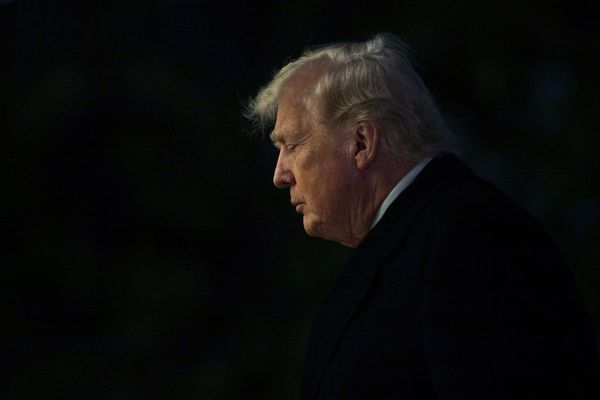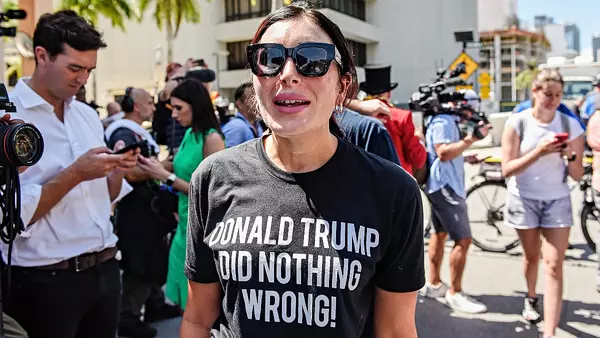
Labor’s Future Made In Australia, typically, emphasises manufacturing products. But what about the services sector and areas like cultural exports? The recent on-again-off-again homophobic book banning by Western Sydney’s Cumberland Council is a reminder that, when it comes to culture wars and social activism, Australia for far too long has been reliant on imports when it should be punching, quite literally, above its weight in what is an increasingly lucrative field of cultural conflict.
It’s time for a Fight Made In Australia policy.
Australia has long been an importer of both progressive and reactionary activism and culture warring. Going back to the 1960s, white Australians and Indigenous activists drew inspiration from the Freedom Rides of the civil rights movement in the United States. Later, the anti-Vietnam War protest movement spilled across universities and the Vietnam Moratorium marches copied the protest movement in the United States, not to mention the near-revolutionary protests in 1968 Europe.
This tradition has continued with pro-Palestinian protesters recently setting up outposts on university campuses, mimicking similar protests in the United States and Europe, similar to the way Black Lives Matter protests in the United States in 2020 sparked BLM protests here.
Right-wing responses to these protest movements have also typically drawn heavily from those found in the United States. For example, local reactionaries and much of the media have criticised pro-Palestinian protests with lines taken verbatim from the United States: student protesters have been accused of antisemitism and supporting terrorism and authorities urged to break up the protests. Even notional “free speech” supporters here have followed the lead of US free speech advocates and decided that free speech criticising Israel should be suppressed.
Indeed, the right has been the most reliable importer of cultural conflicts in recent years: key conspiracy theorists like QAnon have been fully imported from America; confected culture wars such as anti-trans campaigns have been introduced by both media and politicians here from the United States; ideologies such as the “sovereign citizen” movement have been copied directly from the US; book banning, a constant American culture war, was brought to Western Sydney by a right-wing local councillor with a history of comparing COVID lockdowns to Nazi Germany and peddling another US import, the War on Christmas.
But Australia’s culture war exports have been rare. One recent success was Tony Abbott’s anti-maritime refugee campaign, Stop The Boats, which was successfully exported to the United Kingdom via Liberal Party advisers C|T Group, although Rishi Sunak’s Rwanda Solution has struggled to get off the ground and boat crossings of the English Channel have reached a record.
A new independent report by Shonky and DeRorta Consulting (SDC), however, has identified opportunities for Australia to become a “cultural conflict superpower”.
“Australia undoubtedly has a strong autochthonous capacity for culture warring. While annual disputes over January 26 and Anzac Day are not readily exportable, both demonstrate Australia’s strong potential in the sector.”
As an Anglophone culture in the age of the internet, Australia will inevitably share cultural conflicts with the US and the UK, but SDC says that potential has been stifled by the media and government policies.
“As Australia’s media environment is dominated by American culture war giant News Corp, it acts to suppress Australian-produced cultural conflicts in favour of cheaper, US-produced conflicts that the company imports in large numbers without regard to local conditions. Indeed, News Corp’s importation of US cultural wars may violate Australian anti-dumping laws and should be investigated by the Anti-Dumping Commission.”
According to the consultants, The Guardian acts as a similar vector for progressive culture warring, importing conflicts around abstruse identity issues and claims of privilege from elsewhere in the Anglophone world. “While not on the same industrial scale as News Corp, together it means that the Australian media environment is one in which genuinely local cultural conflict is difficult to find amid what, in other markets, would be termed ‘cheap imports’.”
Government efforts to promote social cohesion have also limited the development of a cultural conflict export industry. “The support provided to cultural conflict by the Howard, Abbott and Morrison governments stands in stark contrast to the emphasis on social cohesion of Labor governments and Malcolm Turnbull. For cultural conflict that is proudly Made In Australia, we need a supportive government.”
The consultants urge the establishment of a $5 billion national culture war fund to subsidise the development of “an authentically Australian cultural conflict industry”. The fund would provide production subsidies for culture war content, concessional loans for producers and an innovative equity scheme in which producers of culture wars could share with government the ownership of the intellectual property of conspiracy theories, protest movements and campaigns of vilification.
The fund could lead to Australia generating over $10 billion a year in cultural conflict exports and 15,000 jobs across the information, media and professional services sectors, modelling commissioned for the report shows. Together with the “soft power” benefits of such an industry, this would lead to additional growth of 1.2% of GDP between now and 2050.







